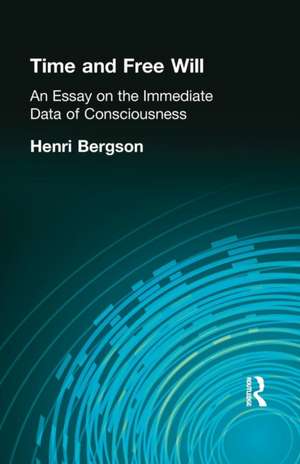Time and Free Will: An Essay on the Immediate Data of Consciousness
Autor Henri Bergsonen Limba Engleză Paperback – 23 dec 2014
| Toate formatele și edițiile | Preț | Express |
|---|---|---|
| Paperback (3) | 65.72 lei 6-8 săpt. | |
| CREATESPACE – | 135.38 lei 3-5 săpt. | |
| Digireads.com – 31 dec 2013 | 65.72 lei 6-8 săpt. | |
| Taylor & Francis – 23 dec 2014 | 411.42 lei 6-8 săpt. | |
| Hardback (1) | 1042.56 lei 6-8 săpt. | |
| Taylor & Francis – 15 aug 2002 | 1042.56 lei 6-8 săpt. |
Preț: 411.42 lei
Nou
Puncte Express: 617
Preț estimativ în valută:
78.72€ • 82.20$ • 65.01£
78.72€ • 82.20$ • 65.01£
Carte tipărită la comandă
Livrare economică 15-29 aprilie
Preluare comenzi: 021 569.72.76
Specificații
ISBN-13: 9781138870994
ISBN-10: 1138870994
Pagini: 280
Dimensiuni: 138 x 216 x 15 mm
Greutate: 0.34 kg
Ediția:1
Editura: Taylor & Francis
Colecția Routledge
Locul publicării:Oxford, United Kingdom
ISBN-10: 1138870994
Pagini: 280
Dimensiuni: 138 x 216 x 15 mm
Greutate: 0.34 kg
Ediția:1
Editura: Taylor & Francis
Colecția Routledge
Locul publicării:Oxford, United Kingdom
Cuprins
Chapter I The Intensity of Psychic States; Chapter II 1I had already completed the present work when I read in the Critique philosophique (for 1883 and 1884) F. Pillon's very remarkable refutation of an interesting article by G. Noel on the interconnexion of the notions of number and space. But I have not found it necessary to make any alterations in the following pages, seeing that Pillon does not distinguish between time as quality and time as quantity, between the multiplicity of juxtaposition and that of interpenetration. Without this vital distinction, which it is the chief aim of the present chapter to establish, it would be possible to maintain, with Pillon, that number may be built up from the relation of co-existence. But what is here meant by co-existence ? If the co-existing terms form an organic whole, they will never lead us to the notion of number; if they remain distinct, they are in juxtaposition and we are dealing with space. It is no use to quote the example of simultaneous impressions received by several senses. We either leave these sensations their specific differences, which amounts to saying that we do not count them; or else we eliminate their differences, and then how are we to distinguish them if not by their position or that of their symbols ? We shall see that the verb “ to distinguish ” has two meanings, the one qualitative, the other quantitative : these two meanings have been confused, in my opinion, by the philosophers who have dealt with the relations between number and space. The Idea of Duration; Chapter III The Organization of Conscious States Free Will; Conclusion;
